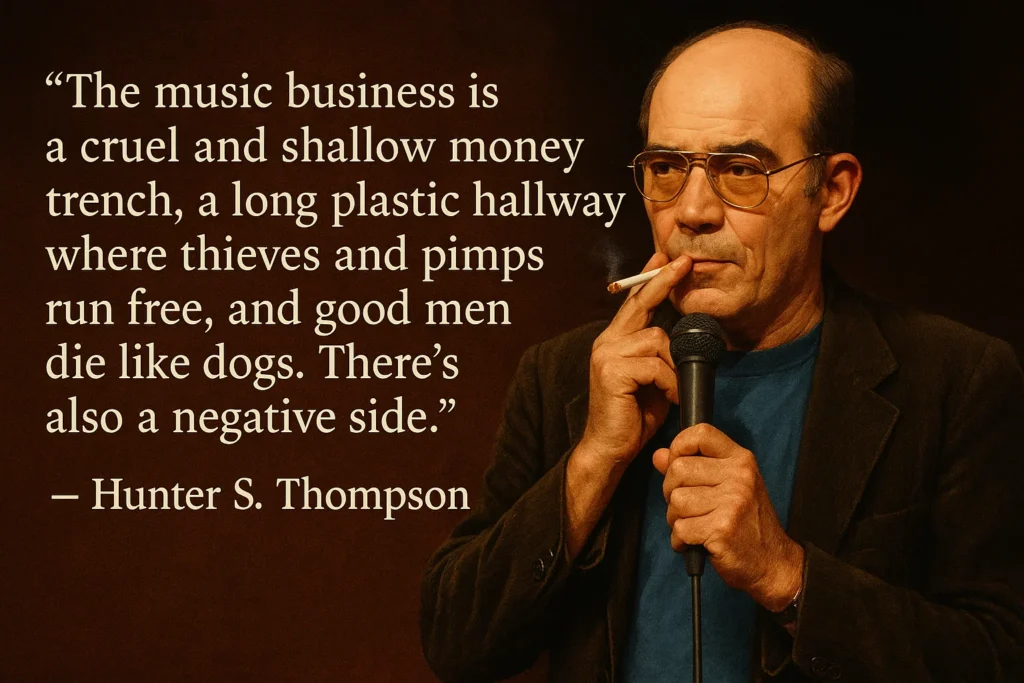Country music is dying not from silence but from surrender. Once a creed of dirt roads and divine lament, it now kneels before algorithms and appeasement. The charts are clogged with hollow men with fake twangs weeping in truck beds, their courage outsourced to marketing firms. Trap beats and TikTok filters replaced the steel and the soul. What was once an altar for grit, prayer, and pride has become a soft-focus confessional for emotional exhibitionists.
Roots of Ruin
The roots of this decay run deep. The rot began when the airwaves were sold to oligarchs. In the 1990s and 2000s, iHeartMedia and its kin devoured local radio, firing the old gatekeepers who actually knew the towns they served. The Telecommunications Act of 1996—Washington’s unholy blessing—let them do it. Playlists were centralized, sterilized, and monetized. Cajun twang, Texas drawl, Appalachian bluegrass—all flattened into one beige frequency of shareholder-safe mediocrity.
Payola scandals like Clear Channel’s 2003 fines proved that the art had been auctioned long before TikTok ever opened its maw. Then Spotify arrived, and the auction became global. Its black-box royalty model turned streams into counterfeit currency. It rewarded quantity over quality, attention over authenticity. Labels stopped nurturing albums and started chasing seconds. They replaced melody with metrics. Artists became data points in a dopamine market.
TikTok twisted the knife. Its clips don’t tell stories—they devour them. Hooks are carved from songs like organs from a corpse, looped endlessly until nothing human remains. What once told the story of a lifetime is now just fifteen seconds of performance anxiety, optimized for likes and stripped of mercy.
Corporate Subversion and ESG Intrusion
Then came ideology wearing a business suit. The ESG regime—Environmental, Social, and Governance—didn’t enter country music with a guitar; it came with a checklist. Universal’s 2023 sustainability report hardwired DEI and climate dogma into artist vetting. Sony boasts its “Social Justice Fund.” Warner parades “inclusive representation” as creative vision. These weren’t policies—they were creeds. And they demanded obedience.
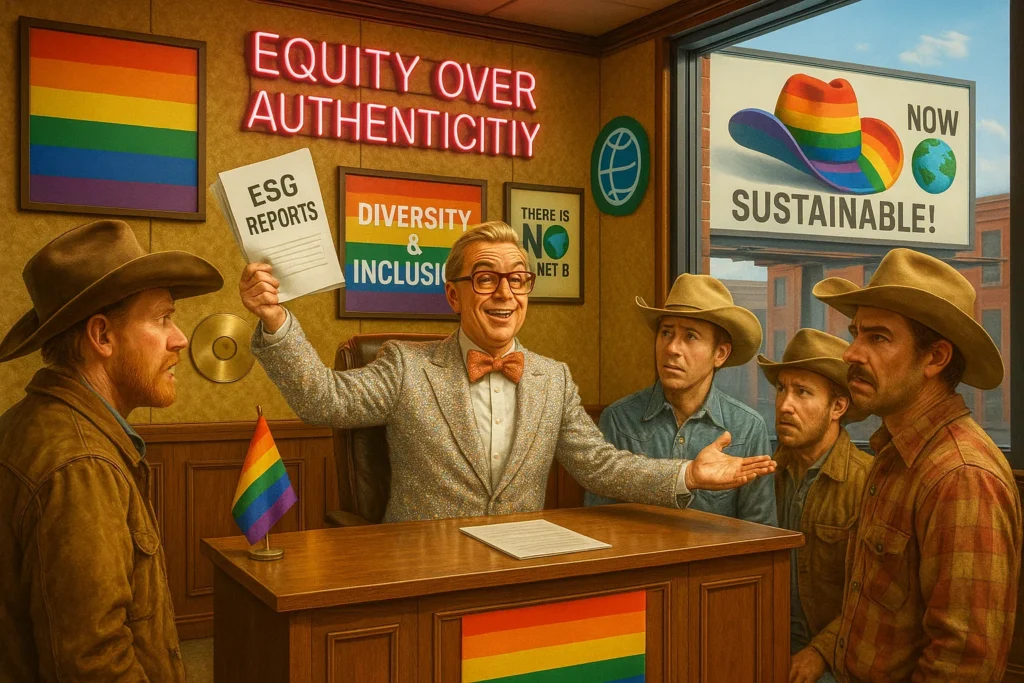
Under this new faith, songs about homesteads, providence, or blood-line duty became heresies. Artists were pressured to swap patriarchal diligence for climate guilt, family fortitude for diversity slogans. The oldest audience in music—older, whiter, and deeply religious—was alienated by design. Labels chased imaginary “global markets” while amputating the American soul that fed them.
What they call “inclusion” is really exclusion—of the faithful, the masculine, and the rooted. They replaced the farmer’s hymn with the NGO’s brochure.
The Three Gatekeepers of Country Music
And when propaganda needed priests, they stepped forward. Critics became commissars.
Chris Willman at Variety preaches that tradition is sin and virtue lies in compliance. He scolds patriots like Jason Isbell for lyrics insufficiently repentant, exalts feminist paeans to abortion as enlightened rebellion.
Jon Freeman, the indie moralizer, quietly demands the erasure of “problematic” tropes—white endurance, border defense, faith in one’s own kind.
Marcus K. Dowling, Nashville’s ideological concierge, whispers through diversity quotas, ensuring the straight-white-male songwriter is treated as a relic to be studied, not heard.

These are not critics. They are cultural auditors, measuring righteousness in pronouns and quotas. They sit like Pharisees in digital temples, crucifying authenticity on inclusion’s altar.
AI: Reformation and Redemption
Then came the machine—and with it, the possibility of deliverance.
AI, if rightly trained, can do what Nashville forgot: remember. But to redeem, it must be baptized in uncorrupted data—what I call a Patriotic Dataset, a Heritage Model drawn from the American canon: Hank Williams’ sorrow, Johnny Cash’s defiance, the hymnal cadence of frontier faith. Without that, AI merely mimics decay. With it, it resurrects the ancestral voice.
We already see the tremors. Search YouTube for “AI Johnny Cash” or “AI Hank Williams.” You’ll find millions listening to synthetic ghosts who sound more alive than half the living. These tracks climb without label payola, carried by algorithms of yearning rather than trend. On Reddit and SoundCloud, fans trade links like contraband Scripture. Nashville insiders whisper that pros are secretly co-writing with AI engines like Suno or Udio, using them as silent partners to sharpen their steel.
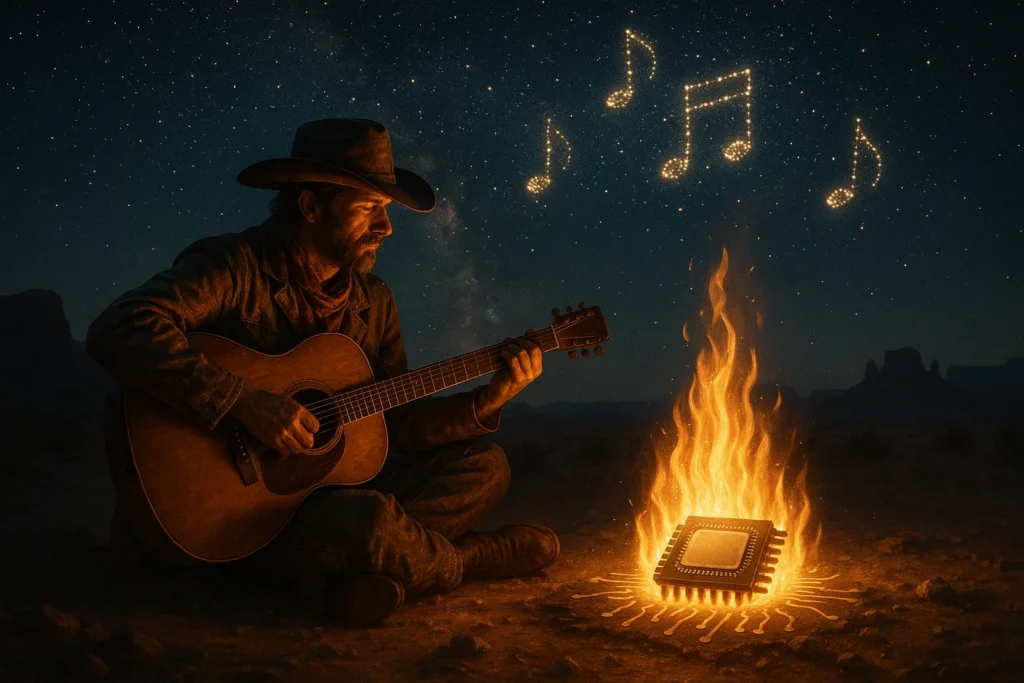
This is the underground revival—a digital honky-tonk where the old spirits walk again.
Reclaiming Ownership
But resurrection means nothing if we remain serfs. Streaming is feudalism in high definition. For every million spins, a songwriter earns a meal at Waffle House. For every vinyl sold, he earns dinner for his family. The math itself is moral.
Physical formats—vinyl and CD—are the new resistance. Vinyl’s ritual, its side-flipping rhythm, honors time itself. A CD is tangible proof that something real once passed through human hands. Each is a rebuke to the ephemeral cloud where woke overlords can erase a catalog overnight.
Indie labels are already rising: vinyl runs up 30%, AI mastering restoring analog warmth. Nashville producers are using AI tools not as crutches but as chisels—LANDR, Ozone, heritage plugins—to bring muscle back to the mix. This is not nostalgia. It’s insurgency.
Declaring War on Spotify
Every revolution needs a front line. This one begins by starving the beast.
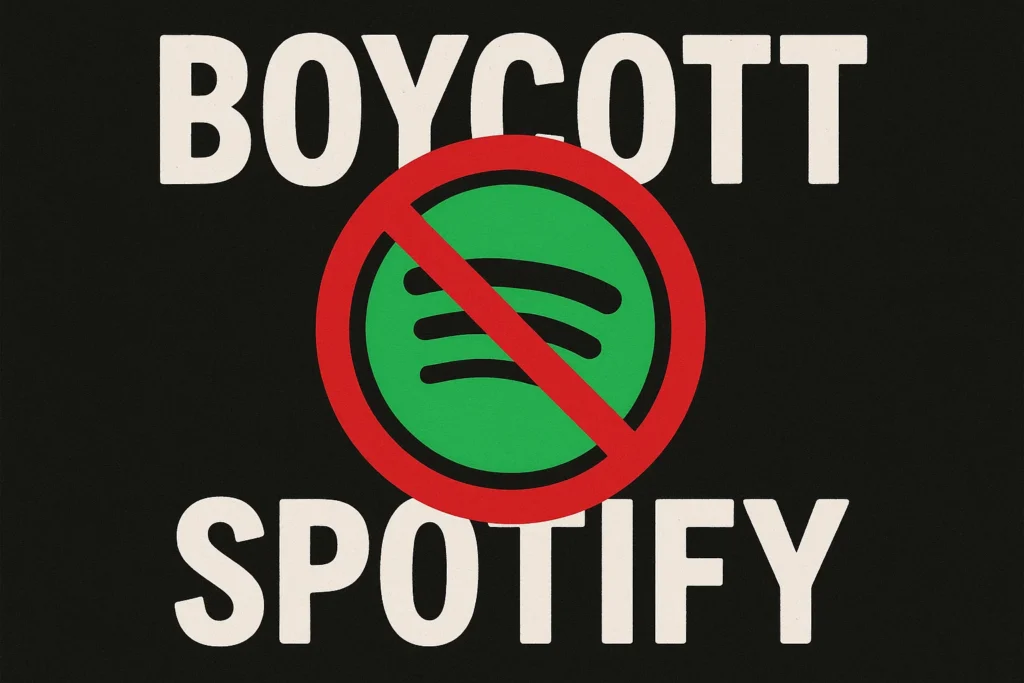
Boycott Spotify. Starve its algorithm. Starve its ads.
Nashville whispers of coalitions forming around a single vow: Physical First. No more feeding a system that rewards cowardice. Independent presses, local stores, fan-to-artist channels—these are the trenches of musical sovereignty.
The Return of the Album
The album is not a format; it’s a form of storytelling, a moral architecture.
When Cash stood in Folsom Prison, he didn’t drop singles—he built a covenant. Albums are pilgrimages—beginning in ruin, ending in revelation. They weave what TikTok amputates: continuity, consequence, redemption.
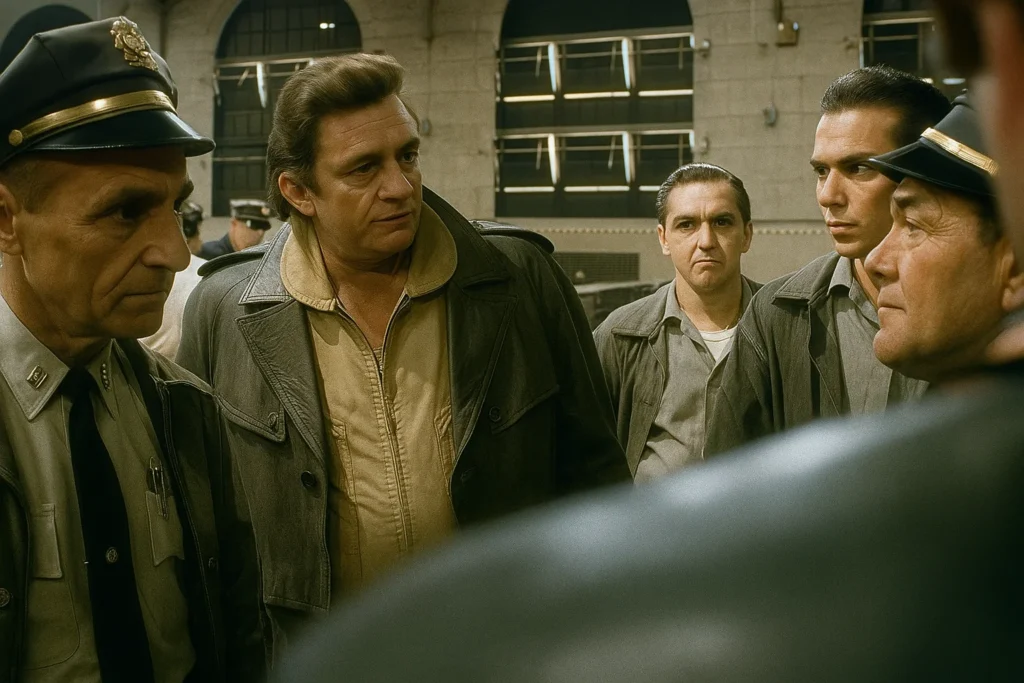
And they are returning. Zach Bryan’s 2023 self-titled record proved the hunger is still there. Indie acts now build entire concept suites—biblical exodus, modern Babylon, Jeremiah in four-four time—many shaped by AI’s silent co-writing. When the industry abandoned narrative, AI gave it back.
Conclusion: Renewal and Dominion
What rises now is not rebellion but renewal. AI democratizes the sacred act of making, freeing the believer from gatekeepers and grifters alike. Critics sneer about “homogenization,” but they mistake harmony for uniformity. Properly curated, AI amplifies difference—it restores dialects the market erased.
The economics seal the prophecy: costs fall, independence grows, and the artist becomes sovereign once more. Contrast this with the hollow 2000s, when labels pushed pop-country karaoke, or with the 1980s outlaw revival, when men like Waylon and Willie wrestled back the reins. History moves in cycles; AI is the next uprising.
Country’s redemption will not come from Nashville’s towers but from basements, barns, and code. The faithful are already building parallel economies—owning their masters, selling direct, and writing songs that glorify God, land, and legacy.
AI will not erase country music—it will resurrect it. The code is the new campfire, and from its light the old songs will rise again.
—Wolfshead
Related Quote
